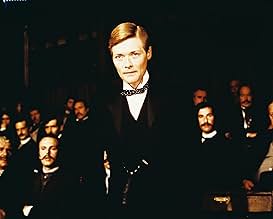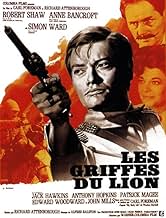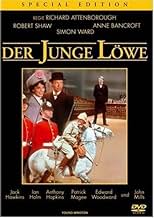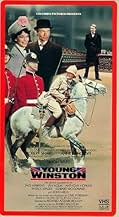AVALIAÇÃO DA IMDb
6,7/10
3,2 mil
SUA AVALIAÇÃO
Relações familiares complexas, assim como uma experiência de combate, formam a personalidade do futuro político mundialmente famoso.Relações familiares complexas, assim como uma experiência de combate, formam a personalidade do futuro político mundialmente famoso.Relações familiares complexas, assim como uma experiência de combate, formam a personalidade do futuro político mundialmente famoso.
- Direção
- Roteiristas
- Artistas
- Indicado a 3 Oscars
- 3 vitórias e 10 indicações no total
- Direção
- Roteiristas
- Elenco e equipe completos
- Produção, bilheteria e muito mais no IMDbPro
Avaliações em destaque
Like most reviewers here - I saw the film originally on the big screen back in 1972. As an eager young historian then - I recall how much this film helped bring to life Winston Churchill and political and social life of Great Britain in the decades before the First World War. Simon Ward was brilliant as the young Winston but Robert Shaw's tortured performance as Lord Randolph Churchill stand out - especially the scene where he is addressing the House of Commons when clearly his mind was fast gowing. Anthony Hopkins does have a small - but crucial role in the film as Liberal M.P David Lloyd George. It was his friendship with Churchill and the then political issue of tariffs v Free trade that led to Churchill leaving the Conservatives and becoming a Liberal for the next 20 years. I do also recall the final 'ghost' scene - so i will be interested to see what the new DVD will do about that as a missing scene from the earlier video release.
This is a movie worth seeing not because it is a well made one but because Churchill's early life was full of adventures no less than Indiana Jones; and all real! Richard Attenborough has tried to cover them all. Starting from clash with Pathans followed by charge against Sudaneese fakirs and fight against Boers. However, flash back technique has been used. So the viewers are transported from adulthood to childhood and back. This rather diminishes the impact of various events on Churchill's life and gets confusing for the viewers unfamiliar with his life history beforehand. Attenborough's depiction of this remarkable life is often quite dull and any strength in this film is due to Churchill's own writings on which the script is based rather than any effort on the part of director and adaptor writer. The director has failed to elicit thrill and suspense from various scenarios when there were numerous opportunities. Story seems to end abruptly. It should have continued to a certain phase in his career e.g. till when he assumes his duties in admirality in twenties or perhaps when he assumes prime ministership. A touch of romance and some view of his married life would have given some diversification to this movie.
Music, cinematography, costumes and makeup are fine, as is the acting and these with Churchill's own writings save this movie from declining into a very monotonous presentation.
Music, cinematography, costumes and makeup are fine, as is the acting and these with Churchill's own writings save this movie from declining into a very monotonous presentation.
This fine film of Richard Attenborough with Simon Ward really does have great legs, just like Ann Bancroft. What a great film with a splendid cast, John Mills, Robert Shaw, Patrick Magee, Tony Hopkins, Ian Holm and the great Jack Hawkins! I had not seen it since its release back in '72 and it was just as delightful seeing it tonight as it was back then.
History buffs may take a few shots at the unevenness of the story line and the flash-backs-- especially, the interviews with Bancroft and Ward-- are a bit distracting but the writing, the script and the film all work together in the hands of a real master, Richard Attenborough. It helps to no end that Ward had the face of the young Winston Churchill and is able to subtly portray the young man burning with ambition. The supporting cast is superb. The events are gloriously Victorian and it leaves not a whit of doubt about the origins of the last of the old imperialists, Sir Winston. The final scenes with Ward giving the speech on the floor of Parliament are wonderful and suggestive of the great oratory that was characteristic of the old British Lion. A great picture of Sir Winnie's rhetoric was given in Harry S. Truman's notes on meeting with him at Potsdam who observed how "[he] spoke in sentences formed into well-formed paragraphs...a master orator." Young, proud, vain, arrogant, ambitious, full of himself and self concerned, and fiercely intolerant of opinions differing from his own,Sir Winston Churchill was indeed one of the controversial albeit great men of our last century. This fine film stands as a fitting tribute to him.
History buffs may take a few shots at the unevenness of the story line and the flash-backs-- especially, the interviews with Bancroft and Ward-- are a bit distracting but the writing, the script and the film all work together in the hands of a real master, Richard Attenborough. It helps to no end that Ward had the face of the young Winston Churchill and is able to subtly portray the young man burning with ambition. The supporting cast is superb. The events are gloriously Victorian and it leaves not a whit of doubt about the origins of the last of the old imperialists, Sir Winston. The final scenes with Ward giving the speech on the floor of Parliament are wonderful and suggestive of the great oratory that was characteristic of the old British Lion. A great picture of Sir Winnie's rhetoric was given in Harry S. Truman's notes on meeting with him at Potsdam who observed how "[he] spoke in sentences formed into well-formed paragraphs...a master orator." Young, proud, vain, arrogant, ambitious, full of himself and self concerned, and fiercely intolerant of opinions differing from his own,Sir Winston Churchill was indeed one of the controversial albeit great men of our last century. This fine film stands as a fitting tribute to him.
In the second half of the twentieth century the biographical epic came into its own. The past hundred years had thrown up a lot of inspirational figures in politics and war, and as that generation of heroes began to die off, and the big motion picture developed an intimate streak, high-budget biopics became a matter of course. And, like anything that is produced often, there soon becomes a standard way of doing it.
The writer of Young Winston was Carl Foreman, of High Noon and Bridge on the River Kwai fame. He had a strong starting point – the writings of Churchill himself, full of the man's sense with words and subtle humour. Foreman structures the first book of Churchill's biography into a coherent and entertaining screenplay – sensibly opening with a burst of action from a period in Churchill's adulthood, which not only hooks the audience but also gives us a promise that this adventuresome time will be returned to later. This is especially important since there are moments in the first hour or so where Young Winston threatens to become a dry, domestic biography. But Foreman makes an error in his striving to get various supporting details across. There are several of these bizarre "interview" segments, where major characters are grilled by an unseen questioner, clunkily breaking up the flow of the story. The revelations in the interviews are important, but a writer of Foreman's calibre should have known better and woven them into the regular narrative.
Foreman also produced, and he selected Richard Attenborough on the strength of his debut Oh! What a Lovely War. Attenborough seems perhaps a little overwhelmed by all the gadgetry of a larger production. His work looks pretty, but doesn't seem to have much point to it, especially the many slow zooms which become a little irritating. Still, there is his ability to create memorable and iconic imagery, both of actors and of landscapes. He also takes care to make the final shot of one scene dovetail somehow into the first shot of the next. For example a slow tilt upwards following Anne Bancroft on a staircase cuts to an opposing downward tilt to bring us in on the teenage Churchill's speech in the school hall. Such smooth linking devices are useful in a picture like this that has many sudden changes in place and tone.
Attenborough was apparently also chosen for his ability to pick a decent cast. He pushed hard for Simon Ward in the title role, and on the whole made a good choice. The fresh-faced Ward deftly depicts Churchill's transition from eager teen to levelheaded military officer. However his adoption of the real Churchill's famous mannerisms and speech patterns in the final scenes verges on the ridiculous. Anne Bancroft gives a steady performance as his mother, although she is perhaps too good at playing cold-hearted women, and when her character's tenderness begins to sour towards the end of the picture it suddenly appears Lady Churchill is going to turn into Mrs Robinson. The finest turn is that of Robert Shaw as Winston's father. He makes Lord Churchill's descent into syphilis-induced dementia poignantly real – you can see the man he was in there still, disintegrating. There are also plenty of big name cameos, but frankly these are far too brief to be of any note or impact on the picture.
So, altogether a mixed-bag of a life story. Everything we need to know is there, it just seems that on all accounts this was not a very cohesive effort, in which script, performances and general production have no particular aim or arc. As such, there are some great set pieces, and considered in bits most of Young Winston is very well done. As a whole however, it has neither the sweep nor the power to give us the impression of a life lived.
The writer of Young Winston was Carl Foreman, of High Noon and Bridge on the River Kwai fame. He had a strong starting point – the writings of Churchill himself, full of the man's sense with words and subtle humour. Foreman structures the first book of Churchill's biography into a coherent and entertaining screenplay – sensibly opening with a burst of action from a period in Churchill's adulthood, which not only hooks the audience but also gives us a promise that this adventuresome time will be returned to later. This is especially important since there are moments in the first hour or so where Young Winston threatens to become a dry, domestic biography. But Foreman makes an error in his striving to get various supporting details across. There are several of these bizarre "interview" segments, where major characters are grilled by an unseen questioner, clunkily breaking up the flow of the story. The revelations in the interviews are important, but a writer of Foreman's calibre should have known better and woven them into the regular narrative.
Foreman also produced, and he selected Richard Attenborough on the strength of his debut Oh! What a Lovely War. Attenborough seems perhaps a little overwhelmed by all the gadgetry of a larger production. His work looks pretty, but doesn't seem to have much point to it, especially the many slow zooms which become a little irritating. Still, there is his ability to create memorable and iconic imagery, both of actors and of landscapes. He also takes care to make the final shot of one scene dovetail somehow into the first shot of the next. For example a slow tilt upwards following Anne Bancroft on a staircase cuts to an opposing downward tilt to bring us in on the teenage Churchill's speech in the school hall. Such smooth linking devices are useful in a picture like this that has many sudden changes in place and tone.
Attenborough was apparently also chosen for his ability to pick a decent cast. He pushed hard for Simon Ward in the title role, and on the whole made a good choice. The fresh-faced Ward deftly depicts Churchill's transition from eager teen to levelheaded military officer. However his adoption of the real Churchill's famous mannerisms and speech patterns in the final scenes verges on the ridiculous. Anne Bancroft gives a steady performance as his mother, although she is perhaps too good at playing cold-hearted women, and when her character's tenderness begins to sour towards the end of the picture it suddenly appears Lady Churchill is going to turn into Mrs Robinson. The finest turn is that of Robert Shaw as Winston's father. He makes Lord Churchill's descent into syphilis-induced dementia poignantly real – you can see the man he was in there still, disintegrating. There are also plenty of big name cameos, but frankly these are far too brief to be of any note or impact on the picture.
So, altogether a mixed-bag of a life story. Everything we need to know is there, it just seems that on all accounts this was not a very cohesive effort, in which script, performances and general production have no particular aim or arc. As such, there are some great set pieces, and considered in bits most of Young Winston is very well done. As a whole however, it has neither the sweep nor the power to give us the impression of a life lived.
YOUNG WINSTON was a film that director Richard Attenborough said was very difficult for him to make...his reputation as a director, in 1972, rested solely on his only previous film, the anti-war cult classic OH! WHAT A LOVELY WAR (1969), and with YOUNG WINSTON, he was expected to tackle a subject that was directly opposite to his point of view. Winston Churchill was the moral center of Great Britain in WWII, staunchly pro-Empire, and anything but anti-war. Yet his early life was an fascinating saga of contradictions, and the director felt that if he could focus on the personal odyssey Churchill experienced, against the backdrop of the dramatic events of the time, it would be a story worth telling. While the end result of Attenborough's labors would not be entirely successful, YOUNG WINSTON is still a rewarding, entertaining movie.
Told as a series of flashbacks, narrated by the older Winston Churchill (mimicked very accurately by the film's young star, Simon Ward), we jump from battlefields in the Sudan to a childhood in Blenhiem Palace, at an occasionally dizzying pace. The son of a brilliant yet self-destructive MP (played, with élan, by Robert Shaw), and his dazzling American wife (the radiant Anne Bancroft), young Churchill worships his parents, but is largely ignored by them, except when the cruelty of a boarding school would become too apparent. Only an average student through most of his youth, he seems destined to a life of mediocrity, at least in his father's eyes, and the parent's cold indifference would only become more pronounced as he experiences the ravages of syphilis, which destroys his career, and would kill him. Too late to win his father's love, Winston blossoms as a student, and determines to win fame, first as a soldier/journalist, then to take up his father's banner in Parliament.
Self-centered, opinionated, and glory-hungry, Winston attracts the animosity of Britain's war staff, yet seems to be anywhere history is being made, from tribal rebellions, to the last cavalry charge in history (seeing Churchill sheath his sword and pull out a pistol as his weapon is a telling sign that the era was ending). Behind the scenes, his widowed mother, trading on her legendary beauty and string of admirers, makes up for her earlier aloofness by using her contacts to help her son 'get ahead'. Yet Winston feels his progress is too slow, and decides to go to South Africa, where the Boer War rages.
As a journalist, Churchill is captured, but, taking advantage of the British prisoners' escape plans, manages to break out of prison, and elude the Boers, while all England watches. By the time he finally reaches safety, the entire world is celebrating him as a hero, and he easily wins his father's seat in Parliament...and takes up the same unpopular issues the elder Churchill had championed, and gone down defending. As Anthony Hopkins, playing Churchill friend David Lloyd George remarks, "A young lion is loose in Parliament."
With an all-star cast (including Jack Hawkins, Patrick Magee, John Mills, Edward Woodward, and a very young Jane Seymour), the greatest credit must go to Simon Ward, the oldest of the three young actors portraying Churchill through his early years. Ward is astonishing, not only physically resembling Winston, but giving the character a humanity that makes his opportunism and ambition far more palpable.
Of note, as well, is Gerry Turpin's cinematography, with it's sweeping vistas of the British army in the field, and Alfred Ralston's rousing score, drawing heavily from Elgar's marches.
While the sheer scope of the story, and flashback approach, ultimately defeat the 'intimacy' Richard Attenborough had hoped for, YOUNG WINSTON is still well worth watching, and helped him prepare for his next film, the even more challenging A BRIDGE TOO FAR.
It is a wonderful film adventure!
Told as a series of flashbacks, narrated by the older Winston Churchill (mimicked very accurately by the film's young star, Simon Ward), we jump from battlefields in the Sudan to a childhood in Blenhiem Palace, at an occasionally dizzying pace. The son of a brilliant yet self-destructive MP (played, with élan, by Robert Shaw), and his dazzling American wife (the radiant Anne Bancroft), young Churchill worships his parents, but is largely ignored by them, except when the cruelty of a boarding school would become too apparent. Only an average student through most of his youth, he seems destined to a life of mediocrity, at least in his father's eyes, and the parent's cold indifference would only become more pronounced as he experiences the ravages of syphilis, which destroys his career, and would kill him. Too late to win his father's love, Winston blossoms as a student, and determines to win fame, first as a soldier/journalist, then to take up his father's banner in Parliament.
Self-centered, opinionated, and glory-hungry, Winston attracts the animosity of Britain's war staff, yet seems to be anywhere history is being made, from tribal rebellions, to the last cavalry charge in history (seeing Churchill sheath his sword and pull out a pistol as his weapon is a telling sign that the era was ending). Behind the scenes, his widowed mother, trading on her legendary beauty and string of admirers, makes up for her earlier aloofness by using her contacts to help her son 'get ahead'. Yet Winston feels his progress is too slow, and decides to go to South Africa, where the Boer War rages.
As a journalist, Churchill is captured, but, taking advantage of the British prisoners' escape plans, manages to break out of prison, and elude the Boers, while all England watches. By the time he finally reaches safety, the entire world is celebrating him as a hero, and he easily wins his father's seat in Parliament...and takes up the same unpopular issues the elder Churchill had championed, and gone down defending. As Anthony Hopkins, playing Churchill friend David Lloyd George remarks, "A young lion is loose in Parliament."
With an all-star cast (including Jack Hawkins, Patrick Magee, John Mills, Edward Woodward, and a very young Jane Seymour), the greatest credit must go to Simon Ward, the oldest of the three young actors portraying Churchill through his early years. Ward is astonishing, not only physically resembling Winston, but giving the character a humanity that makes his opportunism and ambition far more palpable.
Of note, as well, is Gerry Turpin's cinematography, with it's sweeping vistas of the British army in the field, and Alfred Ralston's rousing score, drawing heavily from Elgar's marches.
While the sheer scope of the story, and flashback approach, ultimately defeat the 'intimacy' Richard Attenborough had hoped for, YOUNG WINSTON is still well worth watching, and helped him prepare for his next film, the even more challenging A BRIDGE TOO FAR.
It is a wonderful film adventure!
Você sabia?
- CuriosidadesSimon Ward was a predominantly unknown actor when he was cast as the central character of Sir Winston Churchill in this movie. Richard Attenborough threatened to quit the film if Carl Foreman (who didn't want Ward) didn't agree to his casting.
- Erros de gravaçãoWhen the British artillery is laying waste to the Mahdist charge at Omdurman, several of the extras are obviously running in place so as not to accidentally be near where the explosives detonate.
- Citações
Winston Churchill: I'm free! I'm free! I'm Winston Bloody Churchill and I'm free!
- ConexõesFeatured in Churchill: Renegade and Turncoat (1992)
Principais escolhas
Faça login para avaliar e ver a lista de recomendações personalizadas
- How long is Young Winston?Fornecido pela Alexa
Detalhes
- Data de lançamento
- País de origem
- Idiomas
- Também conhecido como
- My Early Life
- Locações de filme
- Marrocos(South Africa scenes)
- Empresa de produção
- Consulte mais créditos da empresa na IMDbPro
Bilheteria
- Faturamento bruto nos EUA e Canadá
- US$ 4.687.000
- Tempo de duração
- 2 h 37 min(157 min)
- Cor
- Proporção
- 2.35 : 1
Contribua para esta página
Sugerir uma alteração ou adicionar conteúdo ausente








































